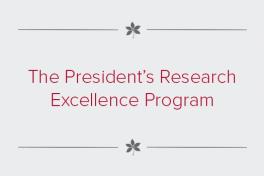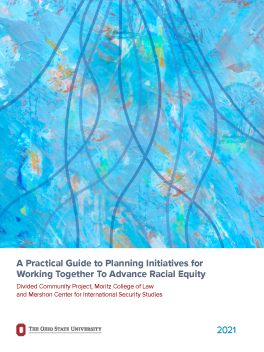Racial Equity Project Co-Lead by Mershon Awarded OSU President’s Research Excellence Catalyst Grant

An interdisciplinary research proposal supported and co-led by the Mershon Center was recently awarded OSU’s prestigious President’s Research Excellence Program Catalyst grant.

The project, titled “University Collaboration on Overcoming Attitudinal and Situational Barriers to Collaborative Initiatives to Advance Racial Equity: A Confluence of Dispute Process Design, Law & Social Science,” was part of only six other projects awarded by the fund, which supports cross- and interdisciplinary teams to pursue large-scale, high-impact research that addresses emerging or existing challenges of national and international societal importance.
BACKGROUND
“This issue of race equity and race relations in the United States is perhaps the largest issue facing our country right now,” said Carl Smallwood, director of the Divided Community Project and co-PI on the project.
In the last year, racial equity has come to the forefront of American societal concerns. And while there is potential to find common ground on shared aspirations for racial equity, proponents of equity find themselves separated by identity, tactics, and even language.

One step the Mershon Center and the Divided Community Project took to address this was through the creation of a racial equity guide, which was published earlier in 2021 and is part of the groundwork for this new project.
The societal challenge the project team identified was how to offer practical ideas to overcome barriers so people can work collaboratively to advance racial equity in communities, preserving group identity and finding shared values.
The team plans to use governmentally-convened Truth and Reconciliation Commission (TRC) modeling, which will offer an opportunity to address controversy or disagreement and determine the best way to move forward to advance racial equity. The TRC model was first developed in South Africa to end the apartheid and has since been successfully modified and used in many other places around the world. During the inception phase of this project, several international transitional justice experts served as advisers, helping the team compare and contrast the similarities and important differences between processes, priorities, and contexts.
“What we wanted to learn from our friends around the world were some of their best lessons, while recognizing that what's going on here in the United States is unique to our history,” said Teri Murphy, Associate Director of the Mershon Center and co-PI on the project.
This project does not aim to endorse a particular approach to racial equity initiatives. Instead, it respects the paths and choices that different advocates have adopted as it synthesizes lessons learned and best practices from a range of international and national contexts. The overarching goal is to offer important considerations and support so that communities can make more informed choices.
INTERDISCIPLINARY APPROACH
What sets this project apart is its collective approach. The team is comprised of researchers from five different areas at The Ohio State University:
- The Moritz College of Law’s Divided Community Project and Program on Dispute Resolution
- The Mershon Center for International Security Studies
- The Knowlton School of Architecture in the College of Engineering
- The College of Social Work
- The Sociology Department in the College of Arts and Sciences
The team was brought together through its shared strengths in community engagement, participatory methodologies, and dispute system design. The group recognized that much of the current research in the field of conflict and process design to advance racial equity is largely siloed, so their approach to include more backgrounds and insights will create a more cohesive and practical set of guidelines for communities around the country to implement.
“This interdisciplinary breadth we believe is pretty unique in doing this kind of work,” said Smallwood. “And we saw it as an opportunity to change the way each of us thought about these processes and bring the expertise of the others out of those silos, to bring them together, and to create something that - to our knowledge - doesn't currently exist.”
As a result of this approach, the team hopes the findings will be more accessible to a wider range of individuals seeking to learn from and build upon their analysis and recommendations.
Novel, interdisciplinary research approaches grounded in emerging social science and centered in dispute systems design theory provide an opportunity to break down barriers to progress racial equity in policing, education, healthcare, etc., and at the same time (multi-layered and sequential) help overcome impediments to advance race equity.
WHAT WE CAN EXPECT
Through this project, the team will research different racial equity initiatives to learn more and offer new insights and expertise to a fledgling process. Additionally, this can help situate the United States with a different level of expertise by expanding their network at the local, state, national, and international level.
“The hope is that we will discover, during the course of this research, some evidence that can be applied in the future to assist these initiatives as they occur around the country,” said Smallwood. “And we intend to publish that work both in a scholarly fashion, so that it can be examined, replicated, and carried forward by scholars around the country, but also for leaders in communities and those interested in commencing planning processes in their communities.”
In addition to this, the team will build off of the first set of racial equity guidelines to improve the effectiveness of U.S.-based TRC-style processes and continue to deepen the relationships with local and state TRC-style commissions and planning efforts. A second edition of the guide is expected in coming months.
